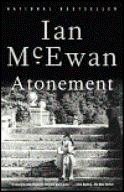
From the Publisher
Ian McEwan’s symphonic novel of love and war, childhood and class, guilt and forgiveness provides all the satisfaction of a brilliant narrative and the provocation we have come to expect from this master of English prose.
On a hot summer day in 1935, thirteen-year-old Briony Tallis witnesses a moment’s flirtation between her older sister, Cecilia, and Robbie Turner, the son of a servant and Cecilia’s childhood friend. But Briony’s incomplete grasp of adult motives—together with her precocious literary gifts—brings about a crime that will change all their lives. As it follows that crime’s repercussions through the chaos and carnage of World War II and into the close of the twentieth century, Atonement engages the reader on every conceivable level, with an ease and authority that mark it as a genuine masterpiece.
About the Author
Ian McEwan was born on 21 June in 1948 in Aldershot, Hampshire, England. He spent much of his childhood in the Far East, Germany and North Africa where his father, an officer in the army, was posted. He returned to England and read English at Sussex University. After graduating, he became the first student on the MA Creative Writing course established at the University of East Anglia by Malcolm Bradbury and Angus Wilson. He is a Fellow of both the Royal Society of Literature and the Royal Society of Arts, a Fellow of the American Academy of Arts and Sciences, and was awarded the Shakespeare Prize by the Alfred Toepfer Foundation, Hamburg, in 1999. He was awarded a CBE in 2000.
In 1976 his first collection of short stories, First Love, Last Rites (1975), won the Somerset Maugham Award. A second volume of stories, In Between the Sheets, appeared in 1978. These stories - claustrophobic tales of childhood, deviant sexuality and disjointed family life - were remarkable for their formal experimentation and controlled narrative voice. His first novel, The Cement Garden (1978), is the story of four orphaned children living alone after the death of both parents. To avoid being taken into care, they bury their mother in cement in the basement and attempt to carry on as normal a life as possible, and an incestuous relationship develops between the two eldest children as they seek to emulate their parents roles. It was followed by The Comfort of Strangers (1981), set in Venice, a tale of fantasy, violence and obsession. The book was shortlisted for the Booker Prize for Fiction.
His next novel, The Child in Time (1987), won the Whitbread Novel Award, and marked a new confidence in McEwan's writing. The story is centred on the devastating effect of the loss of a child through abduction. The Innocent (1990) is a love story set in post-war Berlin. Black Dogs (1992) visits the most significant events of modern European history, ranging from Nazi death camps to post-war France and the collapse of the Berlin Wall. Enduring Love (1997), begins with the death of a man in a ballooning accident, an event that triggers a tale of stalking, fixation and erotomania. Amsterdam (1998) is described by McEwan as a contemporary fable. Three men, a composer, a newspaper editor and a politician, meet at the funeral of their former lover, sparking off a bitter feud. It was awarded the Booker Prize for Fiction in 1998.
Atonement (2001), shortlisted for the Booker Prize for Fiction and the Whitbread Novel Award and winner of the WH Smith Literary Award, begins in 1935 and tells the story of Briony, a young girl and aspiring writer, and the consequences of the discovery she makes about Robbie, a young man destined to play a part in the Dunkirk evacuations. This is currently in development as a film. Saturday (2005), set on one day in February 2003, won the 2006 James Tait Black Memorial Prize (for fiction).
In addition to his prose fiction, Ian McEwan has written plays for television and film screenplays, including The Ploughman's Lunch (1985), an adaptation of Timothy Mo's novel Sour Sweet (1988) and an adaptation of his own novel, The Innocent (1993). He also wrote the libretto to Michael Berkeley's music for the oratorio Or Shall We Die? and is the author of a children's book, The Daydreamer (1994). Film adaptations of his own novels include First Love, Last Rites (1997), The Cement Garden (1993) and The Comfort of Strangers (1991), for which Harold Pinter wrote the screenplay.

